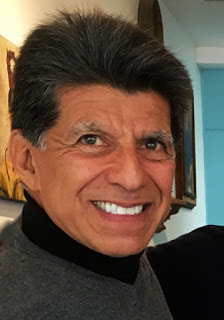Why are these guys staring at me?Excerpt from Harmony of Colors, a novel by Rocky Barilla Chapter 1 – The New Kid Wednesday, September 20, 1961, 3:10 p.m. Franklin Junior High School The after-school mariachi class had just begun at Franklin Junior High School. The instructor, Mr. Padilla, was oblivious to the two new people just entering his classroom. The petite woman, wearing a grey business suit highlighted by pearl stud earrings, approached with a slight limp. This was the principal, Aileen Yoshida. She was escorting a student toward the teacher. “Excuse me, Mr. Padilla,” she said in a very authoritarian tone as she handed the music teacher a yellow slip. “You have a new student.” Mr. Padilla looked at the new student and then glanced at the class enrollment form. The principal abruptly spun around and exited the classroom. The teacher pushed up his glasses and paused for a moment. ¡Ay Dios mio! He muttered under his breath, one more student! In front of him stood a five foot-four, ebony-skinned youth with a jet Afro. Luis bent over toward his cousin and whispered to Miguel, “What’s he doing here?” Miguel shrugged his shoulders to show that he didn’t really know. “He’s a negro, primo,” Luis said in Spanish. “He’s in the wrong class!” The new kid’s head momentarily turned in their direction. * Ten minutes earlier the school bell had rung, dismissing most of the pint-sized students from Franklin Junior High School in the central section of the San Joaquin Valley of California. The torrid heat assaulted them as they exited the air-conditioned rooms. The youngsters squawked and squealed and teased one another. The third day of the new school year was over for most of them. What had happened to their summer vacation? But for a few, the educational process continued. Over by the administration building, there was a beige portable classroom where a handful of students filed in. Some were carrying musical instruments. Others were not. Most seemed to be of Mexican background. “Okay! Okay!” Mr. Padilla addressed his students in a commanding tone. “Please take your positions.” The forty-year-old Enrique Padilla was just starting his eighth year of teaching music at Franklin Junior High School. These students had signed up for his after-school mariachi class. Some of them were carryovers from the year before. Everyone loved Mr. Padilla. He could have passed for a modern day D’Artagnan with his curled up mustache and chin patch. “Don’t forget to hand in the forms that I gave you on Monday,” he gestured with his black-framed round glasses. “Only one form if you have your own instrument. Make sure that your father or mother signs it. The green form if you are borrowing a musical instrument.” The students passed their forms forward and one student got up and placed them on Mr. Padilla’s desk. The teacher gave the new arrival two forms. Ángel walked over to an open seat. “Mr. Padilla,” a student raised his tiny hand. “I forgot my form.” The teacher looked at the short, skinny boy with the crew cut. He shook his head. ¡Ay Dios mio! “Okay, Rafa,” he stared at the youth. “Bring the forms in on Friday.” The eighth grader Rafael “Rafa” Dominguez nodded his head as he pulled down on his white tee shirt. Mr. Padilla picked up a clip board and took a pen out from his plaid vest pocket. “I’m going to take roll call,” he said when he realized that a few students from Monday’s class had not shown up. The first week of class was always chaotic, he thought. “Miguel Nava!” “Here!” shouted out the 13-year-old first violinist. He had been one of Mr. Padilla’s students from the prior year. Miguel sported a barely perceivable peach-fuzzed moustache. “Lisa Nava!” “She’s not here,” her older brother Miguel jumped in. Lisa was Miguel’s younger sister who was the vocalist for the group. She actually did not play a musical instrument, but sang some of the mariachi songs. Unlike her brother, she had not participated the year before and was still debating whether or not she was going to join the group. “Luis Salcedo!” Mr. Padilla continued. “Here!” yelled out Miguel’s cousin, Luis “Güero” Salcedo. He was nicknamed “Güero” because of his light skin color. It was hard for most people to discern that he was Mexican. Next, Rafa replied in the affirmative. “The new student,” the teacher barked out. “Ángel Prieto!” “Prieto!” roared out Luis laughing. “Mr. Salcedo!” admonished the teacher. “You’re the one that called him ‘prieto’.” “That’s his name!” barked Mr. Padilla. The new boy was the center of glaring attentions from the other students. All the kids were Mexican except for the White guitarist Randy Reynolds. Ángel’s dark brown eyes shifted from side to side. It was his first day in a new school. He was fairly new to this country and to the town of Donaldson – far, far away from where he was born. His palms were sweaty and he felt all the anxieties that only a 14-year-old boy can feel: the lack of self-confidence, worries about his appearance, and the apprehension at having to interact with kids who might not like him. Ángel kept looking around. Brown faces (except maybe for one or two) looked back at him. He didn’t say anything. Why are these guys staring at me? “Class, please, settle down,” admonished Mr. Padilla. The teacher resumed the roll call and checked off the names of Mateo “Gordo” Pacheco, Jorge Lopez and his brother Pedro “Pito” Lopez, and Randy Reynolds. It seemed that five students had dropped out since Monday’s class. Mr. Padilla paused for a moment and then came back from his distraction. Something was bothering him. “Okay, listen up, class,” the teacher shuffled some papers. “We are going to review the assignments. Let me know if you still need to borrow a musical instrument.” They went through the class list and set up the musician assignments: Miguel Nava, first violinist, has own instrument Rafael “Rafa” Dominguez, second violinist, needs to borrow Mateo “Gordo” Pacheco, guitarrón, has own instrument Jorge Lopez, vihuela, has own instrument Pedro “Pito” Lopez, flautist, has own instrument Randy Reynolds, guitarist, needs to borrow A controversy arose when Luis “Güero” Salcedo said that he was the trumpeter and needed to borrow the school’s trumpet. Ángel who had remained invisible during the inventory said softly, “I play the trumpet.” The class seemed shocked. They realized that he spoke strangely. He had some kind of foreign accent. “But I don’t have one,” Ángel stuttered. Mr. Padilla walked over to the musical instrument closet. After rummaging through it, he came up with an old trumpet. He handed it to the new arrival. “Please try it out, Mr. Prieto.” Ángel started to finger a few notes, but one of the valves kept sticking. Mr. Padilla retrieved the trumpet. He paused for a second. “Mr. Salcedo and Mr. Prieto, you will have to share the other trumpet. Luis please hand him the trumpet.” Luis frowned. Everything had been settled on Monday. He had played the trumpet with the class the year before. Why did this negro kid have to spoil everything? He thought angrily. “Okay, Mr. Prieto, try this one,” instructed the teacher. Ángel fingered the trumpet again. He was not great, but showed a basic knowledge of the instrument. “Okay, now you, Mr. Salcedo,” Padilla motioned for Ángel to give back the trumpet to Luis. “But he put his nigger lips on it,” Luis cried out. “Mr. Salcedo, shame on you!” Mr. Padilla’s face was red. “We don’t use such language!” Ángel’s dark brown eyes grew larger. Why is this guy giving me a bad time? “Any such language again and I will kick you out of class. That goes for everybody. Does everyone understand?” The teacher was furious. The class was silent. The students didn’t know how to react or what to say. Mr. Padilla grabbed Luis by the shoulder. “Take the mouthpiece to the bathroom and run some warm water through it. Do you understand?” Luis nodded his head “yes.” “And don’t forget to dry it.”  Rocky Barilla, a Los Angeles native, specialized in migrant legal aid and immigration law, then taught in Oregon law schools. From 1979 to 1985 he worked as a staff attorney on various committees of the Oregon Legislature, then in 1986, became the first Latino elected to the Oregon Legislature, representing South Salem. He authored HB 2314 (1987), now known as the Oregon State Sanctuary Law. After moving to the San Francisco Bay Area in 1988, he worked for the California Teachers Association for 21 years and more recently with California Rural Legal Assistance. He is author of several award-winning books, including his latest, “A Taste of Honey.”
0 Comments
|
Archives
April 2019
Categories
All
|
Donate and Make Literature Happen
Somos En Escrito: The Latino Literary Online Magazine
is published by the Somos En Escrito Literary Foundation,
a 501 (c) (3) non-profit, tax-exempt corporation. EIN 81-3162209
is published by the Somos En Escrito Literary Foundation,
a 501 (c) (3) non-profit, tax-exempt corporation. EIN 81-3162209
©Copyright 2022



 RSS Feed
RSS Feed